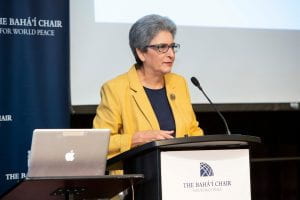This is an insight written by Kathryn Obisesan on the recent Bahá’í Chair for World Peace Conference, Women in the World: Time for a New Paradigm for Peace, held at the University of Maryland on September 24 and 25, 2019.
At the conference, I spoke with Christina Risco, Professor of Psychology at the University of Maryland, about what she felt to took away from the event. She expressed her key takeaway was a reminder “…of how important it is to inform yourself with diverse disciplined perspectives.” Generally, we trust the evaluation of our communities to inform us about the intricacies of an issue. But, when there are multiple perspectives brought to a discussion, we are enabled to step outside of our proficiencies to be aware of the fundamental truths we would of never uncovered in our own frame-view. This conference was a breakdown of individual perspective to welcome a more multifaceted view of feminism.
Dr. Hoda Mahmoudi, the Baha’i Chair for World Peace and Research Professor at the University of Maryland opened the conference immediately diversifying the conversation with personal anecdotes about Iranian women.
 “Iranian women found non-violent ways to support a movement of their self-validation and freedom through art music, dance, and philosophical indulgence. (Mahmoudi)”
“Iranian women found non-violent ways to support a movement of their self-validation and freedom through art music, dance, and philosophical indulgence. (Mahmoudi)”
Following Dr. Mahmoudi, Dr. Galia Golan, Darwin Professor Emerita at the Hebrew University of Jerusalem, scrutinized Blocks to Equality and How to Cope with Them. In her speech, Dr. Golan explains how the main structures of society were built by men for men. Subsequently, these structures act in service to men excluding the viewpoints of women on what women need. From Dr. Golan’s presentation, I learned Radical Feminism calls for more than “a seat at the table” but rather a disintegration of the table to allow for it and restructuring of the table to shape it for both the needs of men and women.
Dr. Laura Sjoberg, Associate Professor of Political Science at the University of Florida, reviewed her reactions to the Iraqi prison scandal. Professor Sjoberg stated she was not surprised by the totality of the acts, but instead by the presence of women in an act so egregious. Sjoberg powerfully says she didn’t think women were capable of being just as erroneous as men. Professor Sjoberg stated that this is not an image of equality but one unfair unequal expectations.
I was appreciative of this talk because it highlighted a portion of Feminism that is often misconstrued or wholly ignored. Feminism does not call for more than equal. It does not call for formulations of systems in which women are on indefensible pedestals. Men and women can both be flawed, but equality calls for this expectation without diminishing the value or reputation of women
Additional themes at the conference included, Legal Empowerment, Mothering While Black, and the Scientific and Cultural Face of Testosterone.
Dr. Margaret Satterthwaite, Professor of Clinical Law at New York University, spoke on the importance of empowering marginalized women to know, use, and shape the law to revolutionize and shape their community.
Dr. Dawn Dow, Assistant Professor of Sociology, University of Maryland, and College Park highlighted the phenomena of baby racism defined in micro-aggressions towards young African American children. Mothers strengthen and empower their children by exposing them to positive images of African Americans in things like books and toys, but also teaching them to engage in strategic sacrifices and expressions to protect themselves.
Dr. Rebecca Jordan-Young, Associate Professor of Women’s, Gender and Sexuality Studies, Barnard College, implored the audience to end the misconstrued and over-perpetuated perceptions of testosterone. She presented studies consistently reasserting little connection between testosterone and violence while contrasting this against charged manner the term is used culturally.
The Women in the World: Time for a New Paradigm for Peace conference was a profusion of diverse voices, a unification of power, and a true demonstration of what it can mean to be a woman. The environment was saturated with inquisitive brains and challenging questions but fortified by mutual understanding and familiarity of shared experience. As Professor Risco said “ We need more conferences like this.”
You can watch all of the lectures from the conference on our youtube page here.
You can find out more about the Bahá’í Chair by watching our video here.
 About the Author: Kathryn Obisesan is a senior Government and Politics – International Relations and Economics double major. She also has studied International Relations and Multilateral Diplomacy in Geneva, Switzerland. Through bringing awareness and implementing thoughtful global philosophy and theory, she hopes the world can progress towards an order rooted in peace and understanding.
About the Author: Kathryn Obisesan is a senior Government and Politics – International Relations and Economics double major. She also has studied International Relations and Multilateral Diplomacy in Geneva, Switzerland. Through bringing awareness and implementing thoughtful global philosophy and theory, she hopes the world can progress towards an order rooted in peace and understanding.
